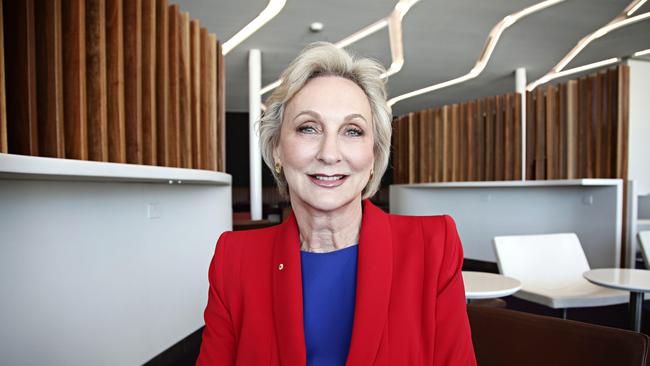Virgin to rethink balance sheet after bloody capacity wars
Virgin Australia chairman Elizabeth Bryan says the airline intends to scrutinise the structure of its balance sheet.

Virgin Australia chairman Elizabeth Bryan says the airline intends to scrutinise the structure of its balance sheet and examine whether it needs to be improved after coming through the bloody capacity war with Qantas.
Ms Bryan, who is a former chairman of oil refiner Caltex, also defended the company’s hedging position, which analysts have suggested prevented Virgin from enjoying the same windfall from the big drop in oil prices as its arch rival, noting “it is not that one way is right and one way is wrong, that some person is smarter and one is more stupid’’.
Virgin reported a strong half-year profit result last month and chief executive John Borghetti said the airline was on track to post a profit for the 2016 financial year and deliver a return on invested capital in line with its cost of capital.
But analysts raised concerns the airline’s poor cashflow position could hurt the full-year result after net operating cashflow fell to just $10m at December 31 from $65m a year earlier.
The airline still has $907m of cash sitting on its balance sheet, but its unrestricted cash balance fell to $544m during the half, down from $719m at June 30. It is also forecast to carry $2.1 billion of net debt this year. A move into negative cashflow would see Virgin start eating into its cash pile.
“Virgin Australia’s balance sheet is out there for the world to see. It is a balance sheet that carries some significant leverage, which is sort of what you would expect given the growth spurt it has been through,” Ms Bryan told The Australian.
“But it is a very volatile financial sector out there and it is probably not a good time to be raising money in those international debt or equity markets.
“How you run your balance sheet also allows you to optimise how you make other operational decisions. And so I think all of that is an area that is probably timely for Virgin to have a look at.’’
Asked about the prospect of an equity raising, Ms Bryan replied: “It would not be an appropriate thing to comment on at the moment ... But certainly the structure of the balance sheet and how that impacts the operations of the business is something you would look at in this phase of the company’s growth.’’
At its post-results briefings, Virgin indicated that the negative working capital position at December 31 was the result of lower forward seat sales due to Virgin having more corporate customers, who tend to book later.
There was also a lower number of international seats for sale as the airline refurbishes its Boeing 777 international fleet. It said the effect would unwind in the second half.
And while Morgan analyst Mark Williams said there was no apparent need for an equity raising soon, he added that if “management can’t arrest the decline in free cashflow by the time the cycle turns, Virgin may be needing to look for ways to bolster its cash position.’’
Over the past few years, Air New Zealand, Etihad and Singapore Airlines have emerged with a combined stake of about 70 per cent in Virgin. Sir Richard Branson's Virgin Group also has a 10 per cent stake.
The last time Virgin raised equity from its shareholders, in late 2013, its total cash balances were below $600m as the bloody capacity war with Qantas was taking its toll. Virgin then raised $349 million in fresh equity and nine months later raised a further $336 million by selling a 35 per cent stake in the Velocity loyalty program to Affinity Equity Partners. Analysts have also noted that while falling oil prices saved the airline $53 million in expenses during the half-year, Virgin did not enjoy the same windfall as Qantas and has only 14 per cent participation in the lower oil pricing for the remainder of 2016.
But Ms Bryan said on the issue: “It is not a problem — it is a fact of life,’’ noting the benefits of the low oil price for Virgin were offset by up to half of its cost base being denominated in US dollars. ‘’You have to wrap around that a hedging policy, so that if you get a movement in one, it doesn’t swamp the company — that you can stand the volatility. We are small company with big exposures. So you can't just run big unhedged positions,’’ she said.
“Qantas has the same asset structure but it has a big US-dollar income stream so it has a natural hedge we don’t have. And it is a bigger company so can probably withstand more volatility. It is quite legitimate to run a different way of managing that.’’





To join the conversation, please log in. Don't have an account? Register
Join the conversation, you are commenting as Logout